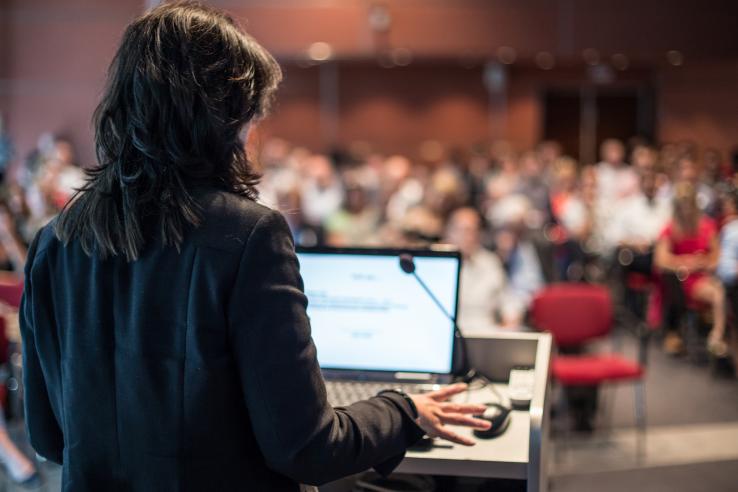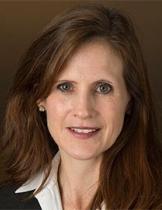
Fostering inclusion in economics: Alicia Sasser Modestino on gender and the dynamics of economics seminars

Economics, as a tool to improve policy and serve communities, is at its most powerful when it includes everyone. Therefore, our work at J-PAL is better when it represents as many perspectives as possible, and we all miss out on key insights when it doesn’t. In this series, we speak to J-PAL-affiliated researchers who are working to cultivate an environment where economists of all backgrounds are able to contribute to the quality and credibility of the field, and also feel safe and valued. Part one features Marianne Bertrand on inclusivity at the American Economics Association; part three features Matt Notowidigdo on the value of mentorship programs.
In part two, we sat down with Alicia Sasser Modestino (Northeastern University) to talk about gender dynamics in economics seminars. In 2021, Dr. Sasser Modestino and co-authors released the results of a study that sought to quantitatively measure the gender dynamics of seminar culture within economics. While the study focuses on problem diagnosis and is therefore not a randomized evaluation, this descriptive work can help lay the groundwork for future randomized evaluations in this area.
You and several co-authors put out the first systematic analysis of gender dynamics in economics seminars. Can you share your findings?
Our team collected data on every interaction between presenters and their audience in hundreds of research seminars, job market talks, and during the National Bureau of Economic Research (NBER) Summer Institute. Even after including a rich set of controls, we found that women presenters are asked more questions during economics seminars, and the questions that are asked of women are more likely to be patronizing or hostile. We feel that this adds to the emerging but ever-growing literature that documents ways in which women in economics are treated differently than men.
Why are the gender dynamics of seminars important to consider against the backdrop of the broader culture of diversity, equity, and inclusion throughout the profession?
One of the motivations for this study came from the code of professional conduct that the American Economics Association (AEA) adopted in 2018, which was targeted at freedom of economic discussion. The results from the 2019 AEA climate survey, however, demonstrated that the degree to which those in economics experience this freedom varies significantly across different groups. For example, nearly half of female respondents, compared to a quarter of male respondents, reported that they had not presented their question, idea, or view at their school or place of work to avoid possible harassment, discrimination, or unfair behavior.
By effectively excluding such a large percentage of economists who have different views, we limit our ability as a field to contribute to new knowledge and limit the space for those with different viewpoints to have their perspectives on that knowledge heard.
This paper includes a unique co-authorship. Can you speak to the role of the Seminar Dynamics Collective in this study?
The Seminar Dynamics Collective is a group of 103 members of the economics community who collected and/or processed the data that is used in this study, so we consider them to be co-authors of this paper. About a third of them are named in the footnote to our paper on the first page, but about two-thirds of them are unnamed because they fear retaliation either as students, recent graduates, or even assistant professors. As we were recruiting, there were times when some students chose not to participate in the study because they felt that the risk was too great. We took great pains to not identify the coders to anyone—even each other—so that we could protect their anonymity. It speaks volumes to the importance of this work that over a hundred individuals were willing to give their time on a weekly basis, largely while they were training in a program, to collect this data and highlight the disparities that most of us have observed in a seminar room.
What were some challenges that you faced in collecting data and conducting the analysis?
The first thing that we needed to do was recruit coders to collect data in each of the seminars at each institution we targeted, but without making it publicly known that we would be collecting such data. This is because our IRB specified that as long as the coder was invited to the seminar and allowed to take notes—as most graduate students are—we would not need to ask participants for consent because this information was already observable. That meant we had to recruit coders using word of mouth from each of the institutions, which was not a small feat when you're trying to collect data from thirty of the top economics departments.
Another challenge was at the NBER Summer Institute. The Summer Institute graciously invited our coders to attend. However, the NBER president felt that he needed to let the program directors know what was going on, and to alert participants that there was a group studying seminar dynamics who would be taking note of the interactions that were happening throughout the Summer Institute. That was a little bit troublesome because we were concerned that this would change people's behavior. In some cases it did.
My female co-authors, Pascaline Dupas and Muriel Niederle, and I were worried that this would affect the results to the point where we wouldn't be able to detect any behavior. However, our other co-author Justin Wolfers felt the behavior was so egregious that we were still going to find something—and ultimately he was right. In macroeconomics particularly, which is economics’ most male-dominated field, results were striking in terms of the gender differences across the board.
I often characterize economics as having blinders in terms of detecting discrimination compared to other fields. The field often ascribes to Gary Becker's theory of discrimination, which states that in a competitive market, there will be forces that weed out discriminatory behavior because it's not efficient. However, this does not take into account who makes up the market. When we look at something like the dynamics of an economics seminar, we have to realize that we are the market. If we are not willing to take note, take action, and recognize that there is discriminatory behavior, then it is very difficult to weed that out.
What are ways you have seen (or would recommend) that seminars be structured to prevent this discriminatory treatment?
A strong moderator is what is most needed to be able to change the discourse in economics. Moderators make sure that the speaker has enough room to present their work and gain traction before being interrupted. They will often defer questions to later if it seems like they're being asked too early. If someone is being hostile, rude, or even paternalistic, it's up to the moderator to call that behavior out, particularly when we are in our own home department seminars, where students are watching what we are doing. The only way that we're going to change the culture of economics is by making sure that we model behavior that is better for the next generation of economists.
What do you think organizations like J-PAL can or should be doing to advance inclusion in the field of economics?
Because J-PAL focuses on issues of poverty and inequality, it has a particularly important role to play as a leader; making sure that scholars from under-represented or marginalized groups have the room to be able to do groundbreaking research. The core of J-PAL’s mission is to be able to provide data-driven insights to change policy and reduce poverty. Making sure that scholars who represent many different communities are part of this work is key to this mission. In particular, J-PAL's regional scholars programs —which provide grant funding and mentorship to researchers based in low- and middle-income countries— and J-PAL North America's Economics Transformation Project are great starts. But we all need to commit to making continued progress on this front if we really want to create a sense of belonging for those who have typically been marginalized by the profession.


